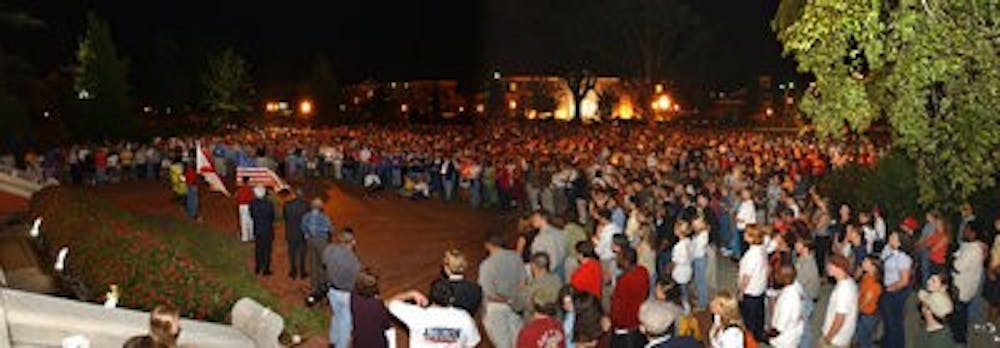Ten years ago on Auburn's campus, everything stopped.
"When we heard the news, every class stopped," said Napo Monasterio, 2001 editor of The Plainsman. "Everyone and everything just stopped. I remember coming into the newsroom and everyone was gathered around the TV in complete shock."
Sept. 11, 2001, was a day most remember vividly and will never forget.
Susan Brinson, professor of communication and journalism, remembers the day clearly.
"Students came to the department to watch the TV, professors were in their offices watching, and everyone stopped everything," Brinson said.
Students were intrigued by what was going on, and many were asking questions and beginning to realize how important this event was in the history of our country, Brinson said.
The next four days, coverage of 9/11 dominated television sets.
Brinson chose to talk about the event instead of ignoring it. She decided to use the experience as a learning tool in the classroom.
"Let's make this an educational moment," Brinson said. "Look at the information they are giving us, how much of it is going to be wrong because they are trying to talk about it as it is happening."
Students in all departments grew in different ways after the attack.
"For us, it changed the way we treated journalism," Monasterio said. "It made us grow up quickly. We learned how to cover stories from the way news channels covered the event."
Not only did journalism students grow by dissecting the media, but engineering students also learned from analyzing the makeup of the buildings.
Brinson said some engineering professors used this as a time to teach students about the structure of the buildings and how they crumbled to the ground.
While students and professors grew from an educational standpoint, some were emotionally troubled.
"First, I was devastated and heartbroken for all of the people who worked in the towers. They had no idea how many people had been killed," Brinson said.
Weeks later, reports showed that nearly 3,000 people had been killed in the attacks.
Many families lost loved ones, but students at Auburn lost something as well.
"Students have a sense of security when they come to Auburn, and a lot of people lost their sense of security and innocence," Monasterio said.
The losses the nation sufferes on that day are difficult to contemplate, but some believe it is necessary.
"I think it is an important thing to look back on,because it was a significant event and we are still trying to cope with the changes that took place," Brinson said.
The calamity also brought a glimpse of light to America.
"Being from Spain, at that point we all became Americans. It gives you an extra sense of patriotism of American pride. It doesn't matter where you are from, right now you are here and you are one of them," Monasterio said.
People came together and gained a renewed sense of pride for the country, said Bill Ham, mayor of Auburn.
"From one end of the city to another, there was a sense of renewed patriotism," Ham said.
On the 10th anniversary of the devastating attacks, stop and reflect.
Do you like this story? The Plainsman doesn't accept money from tuition or student fees, and we don't charge a subscription fee. But you can donate to support The Plainsman.





